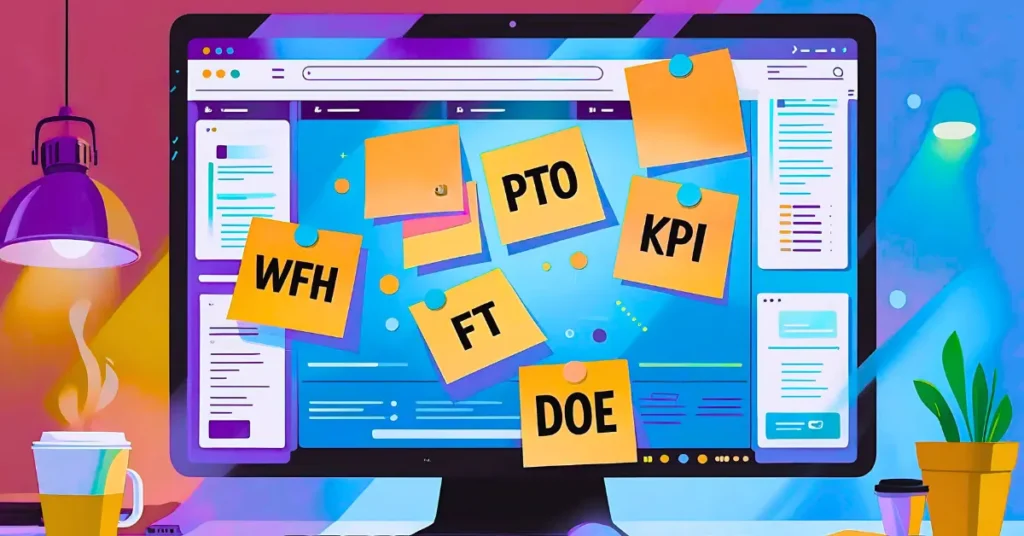Ever read a job post and come across a string of letters that make no sense? Don’t stress—they’re probably just common abbreviations used in work settings. (Unless that employer really is just throwing in random ABCs for fun.)
To help you out, I put together a list of abbreviations you’ll likely see in job listings—especially useful if you’re new to job hunting or just need a quick refresher.
- 1099 – Independent Contractor (U.S.)
You’re self-employed, pay your own taxes, and don’t get benefits.
- 1099 – Independent Contractor (U.S.)
- B2B – Business to Business
Selling services/products to other businesses.
- B2B – Business to Business
- B2C – Business to Consumer
Selling directly to individual customers.
- B2C – Business to Consumer
- C2C – Corp to Corp
A contract between business entities (often agencies or freelancers).
- C2C – Corp to Corp
- COE – Certificate of Employment
A document proving you worked at a company.
- COE – Certificate of Employment
- CTC – Cost to Company
Total compensation, including bonuses and benefits.
- CTC – Cost to Company
- DOE – Depends on Experience
Salary depends on your experience level.
- DOE – Depends on Experience
- EOD – End of Day
A deadline by the end of the business day.
- EOD – End of Day
- EOE – Equal Opportunity Employer
They don’t discriminate based on race, gender, etc.
- EOE – Equal Opportunity Employer
- ETA – Estimated Time of Arrival
When something (or someone) is expected to arrive or be ready.
- ETA – Estimated Time of Arrival
- FTE – Full-Time Equivalent
Workload equal to a full-time job, even if shared between part-timers.
- FTE – Full-Time Equivalent
- FT – Full-Time
Typically means working 35–40 hours per week.
- FT – Full-Time
- HMO – Health Maintenance Organization
A type of health insurance plan offered as a benefit.
- HMO – Health Maintenance Organization
- HYB / Hybrid – Hybrid Work
A mix of in-office and remote work.
- HYB / Hybrid – Hybrid Work
- KPI – Key Performance Indicator
A measurable goal to track your success on the job.
- KPI – Key Performance Indicator
- KRA – Key Result Area
Similar to KPIs—used to define the main responsibilities or goals in a role.
- KRA – Key Result Area
- L&D – Learning and Development
Training or career growth opportunities offered by the company.
- L&D – Learning and Development
- LOA – Leave of Absence
Extended time off work, often for personal or medical reasons.
- LOA – Leave of Absence
- NDA – Non-Disclosure Agreement
A legal contract to keep certain information private.
- NDA – Non-Disclosure Agreement
- OOO – Out of Office
Used to indicate you’re away and not working.
- OOO – Out of Office
- OT – Overtime
Extra hours worked, often paid at a higher rate.
- OT – Overtime
- PTO – Paid Time Off
Vacation/sick days where you’re still paid.
- PTO – Paid Time Off
- PT – Part-Time
Fewer hours than full-time, usually under 30–35 hours weekly.
- PT – Part-Time
- RTO – Return to Office
The employer expects you to work on-site again.
- RTO – Return to Office
- RSVP – Répondez s’il vous plaît (Please respond)
Sometimes used for mandatory work events or invites.
- RSVP – Répondez s’il vous plaît (Please respond)
- SOP – Standard Operating Procedure
A documented process or guideline on how tasks are done.
- SOP – Standard Operating Procedure
- TBD – To Be Determined
Something (like pay or schedule) hasn’t been finalized.
- TBD – To Be Determined
- WFH – Work From Home
You can work remotely from home.
- WFH – Work From Home
- W2 – Employee Classification (U.S.)
Standard employee with taxes withheld and benefits provided.
- W2 – Employee Classification (U.S.)
- YOE – Years of Experience
The amount of relevant work experience required.
- YOE – Years of Experience



